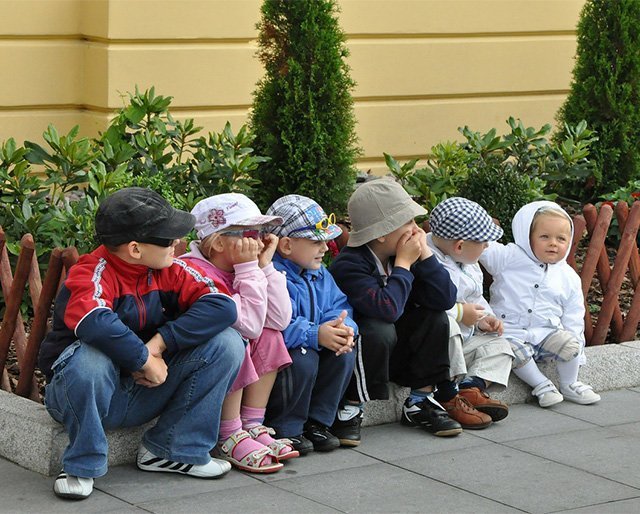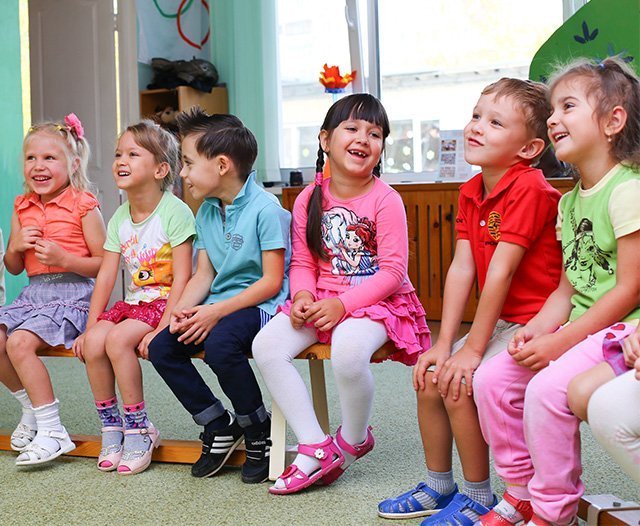Sex ed.
Two tiny words that make so many people uncomfortable. Like my parents, who were so uncomfortable that they sent a note every year to my school instructing my teacher to excuse me from sex ed classes and send me to study in the library. So I learned from my friends instead, and suffice it to say, they weren’t the most factual educators.
I thought I was injured or dying when I got my first period, and my understanding of birth control, safer sex, and healthy relationships wasn’t much better a few years later. Most of what I learned was from Judy Blume books and the other kids in school. Let’s just say Judy was far more accurate than my friends.

We have a responsibility to prepare our children for life and teach them how to keep themselves safe. As parents, we can lay a solid foundation by teaching our kids the correct anatomical terms for the parts of their body from the very beginning. No “wee wee” or “hoo ha” or “front bum” (WTF?). Teach your toddler to name their parts – vulva, vagina, labia, penis, testicles, and scrotum – and explain that they are the boss of their bodies.
Health information should come from an educated adult instead of peers, but since not all parents want to or feel comfortable having these conversations, it’s important to ensure kids have the opportunity to learn from trained professionals. I mean, I know how to multiply, but my child’s math teacher has spent years learning how to teach children the fundamentals of mathematics and the math skills they’ll need in all the multiplication-related situations they might run into.
Almost all parents will grapple with the question of when kids should start learning about sex and sexual health so let’s be clear. Experts recommend starting in preschool.

Why So Early?
Couldn’t we wait until middle school ? Why so early?
I asked this question of Saleema Noon, a recognized expert in the area of sexual health education and co-author of Talk Sex Today, a guidebook for parents who want to know what to teach and when from birth through their teen years. She gives three main reasons why kids should start learning about sexual health at a young age1:
- Young children (age 2-4 years) are easiest to teach. They haven’t learned that it can be embarrassing to talk about bodies and sex, and can name the penis like it’s the elbow! By the time they get to grade 4 or 5, on the other hand, children are completely grossed out about anything to do with private parts, relationships, and especially, S-E-X. We have to surmount the embarrassment barrier before they can accept the information they need.
- Children need to be armed with accurate information about sexual health before they get their questions answered on the playground, by older friends or on the internet. They need to have the knowledge necessary to dispel the crazy myths they hear at school (i.e. Mountain Dew kills sperm) and permission to check out the facts with mom or dad rather than accept everything they hear as the truth.
- Studies from all over the world consistently show that children who are educated about healthy bodies and healthy sexuality are protected from child sexual abuse. Even if children are not asking questions yet (some never will) we need to give them information about their bodies and help them to develop strong personal boundaries. Sexual offenders (85% of whom are known to the victim) prey on children who aren’t educated about their bodies and therefore lack the skills to differentiate between appropriate and inappropriate touching. These children find it hard to say “no”, especially to an adult, and may not report abuse for fear of getting in trouble.
We don’t want to think about it, but the truth is that our babies will be exposed to a lot of “adult” situations long before we as parents will ever be ready. If you wait until you think your child is ready, it could already be too late. We need to teach kids before they need the information, because chances are we won’t be there in the exact moment when they do need it.
Saleema says, “[T]he reality is that kids at earlier and earlier ages are going to hear things about sex and sexual health from unreliable sources (an informant on the playground, friend’s older brother, the internet) so we need to get to them first with accurate information…It all comes down to protection, prevention and preparation.”
Together or Apart?
My own daughters are in grades one and three, and they just attended one of Saleema’s classes. I must admit I was a bit surprised when they told me that the boys and girls were all taught together. Back when we were kids, it was routine to separate the girls in one room to learn about periods while the boys went somewhere else to talk about erections and wet dreams.
But after some thought, I realized that teaching them together just makes sense. If we don’t want grown men thinking that we can “hold” our periods, or grown women thinking that erections equal sexual desire, then all children need to be educated about both male and female bodies.
And as Saleema puts it, “It’s important they learn about each other, it fosters respect. Plus, we don’t separate them [in any other class] in school so we don’t want to send them the message right off the bat that this is something they should be embarrassed talking about in front of the opposite sex.”

When Is It TMI?
It’s normal for parents to be concerned that sexual health information might be too explicit or presented too early. Many parents worry that teaching young children about sexual health will cause them to grow up too fast or encourage them to experiment with sex. But research shows that it’s actually the opposite. Curious, uninformed kids are more likely to make poor choices or experiment in ways that can lead them into potentially exploitative situations.
Saleema wants parents to know, “There’s no such thing as telling a child too much. Whatever they’re not ready for will just go over their head! But because we don’t know when kids are exposed to (mis)information, we have to stay one step ahead of the game as parents and arm our kids with the correct vocabulary and information.”
Rest assured, comprehensive sexual education is more than just anatomy or the mechanics of sex. It also includes information around consent and boundaries and privacy. For example, Saleema tells kids, “Babies are usually made by sex, but don’t worry, it’s nothing you have to worry about any time soon because it’s only for adults. In fact, it would be against the law for kids to have sex.”
Will there be awkward questions and giggles after class?
Probably.
Will they (and you) get over it and move on to more important topics like, “What’s for dinner?” and “Can we get a puppy?”
Definitely.
Further Reading
- Talk Sex Today by Saleema Noon and Meg Hickling
- The New Speaking of Sex: What Your Children Need to Know and When They Need to Know It by Meg Hickling
- Where Did I Come From? by Peter Mayle
- It’s Not the Stork!: A Book About Girls, Boys, Babies, Bodies, Families and Friends by Robie H. Harris
1. Hickling, M. (1999). More speaking of sex: What your children need to know and when they need to know it. Kelowna, BC: Northstone Publishing.
Disclosure: This post contains affiliate links. As an Amazon Associate I earn from qualifying purchases, at no additional cost to you.








I think that’s a great age, they are so curious at that age.
I’ve been having this discussion with my husband. Our daughter is 6 and he thinks it’s too early for her to have to know any of this but I think she should. Of course she’s not going to have sex, but I’m trying to explain to him that sex ed isn’t how to have sex! It’s to protect her from abuse, teach her to take care of herself, understand her body, and things like that. I sent this to him so maybe it will help. Thanks.
I personally think 10 at the latest is a good age
Perfect read for me. My four year old has been asking a lot of questions. I wasn’t prepared but i did use the correct terms. Completely agree with that.